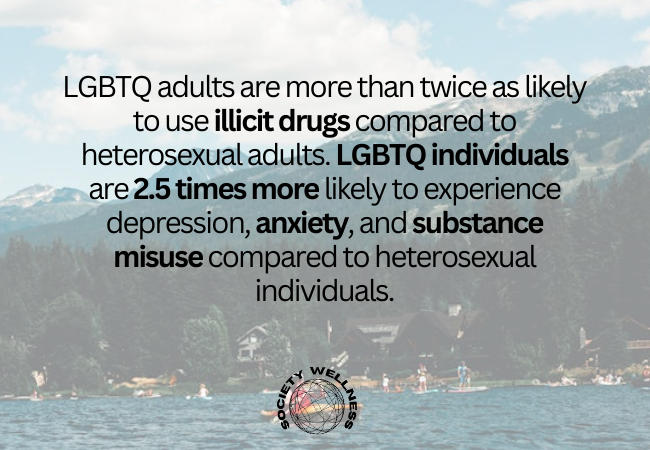Watching a loved one struggle with addiction can be a painful and frustrating experience, especially when they refuse help. Addiction impacts not only the individual but also their families, relationships, and communities. For LGBTQ individuals, the challenges of addiction are often compounded by societal stigma, discrimination, and a lack of inclusive resources. Understanding how to approach these situations with patience and compassion is key to encouraging recovery.
This guide offers actionable strategies and insights for helping someone who resists treatment while maintaining your own well-being throughout the process.
Understanding the Struggles of Addiction
Addiction is a chronic, relapsing condition that affects brain function and behavior. This makes it incredibly difficult for individuals to recognize the severity of their condition or admit they need help. Addiction often coexists with emotional pain, past trauma, or mental health issues, creating a cycle that is hard to break.
For LGBTQ individuals, addiction can be even more complex due to external pressures like discrimination, societal rejection, and identity struggles. These stressors often lead to higher rates of substance abuse within LGBTQ communities.
Why Some Addicts Refuse Help
Many individuals resist treatment because they are in denial about the severity of their addiction or are afraid of the changes that recovery entails. For LGBTQ individuals, reluctance to seek help is often tied to concerns about judgment, fear of stigma, or lack of access to affirming care.
Signs That Someone Needs Help
Recognizing the signs of addiction can help you determine when to intervene. While some indicators are obvious, others may be more subtle, especially in LGBTQ individuals who might conceal their struggles due to fear of judgment.
Behavioral and Emotional Indicators
- Increased secrecy about their activities or substance use habits.
- Mood swings, irritability, or periods of emotional withdrawal.
- Avoiding responsibilities at work, school, or home.
- Relying on substances to cope with stress or emotional pain.
Physical Health Warning Signs
- Noticeable changes in weight, appetite, or appearance.
- Frequent fatigue or irregular sleep patterns.
- Physical symptoms such as tremors, bloodshot eyes, or poor hygiene.
Impact on Relationships and Responsibilities
- Strained relationships with family, friends, or romantic partners due to dishonesty or erratic behavior.
- A noticeable decline in work or school performance.
- Financial difficulties, legal problems, or frequent unexplained absences.
Why LGBTQ Individuals May Conceal These Signs
Substance misuse may be normalized in some LGBTQ social settings, such as clubs or bars, making it harder to recognize a problem. Additionally, fear of stigma may lead individuals to downplay their struggles.
Reasons Why Addicts Refuse Help
Denial and Stigma
- Many addicts convince themselves they don’t have a problem, even when their substance use causes harm.
- LGBTQ individuals may fear judgment for both their addiction and their identity, making them hesitant to seek help.
Fear of Judgment or Failure
- The idea of being labeled a failure can prevent individuals from acknowledging their need for treatment.
- LGBTQ individuals may worry about encountering non-affirming care providers who lack understanding of their experiences.
Emotional and Psychological Barriers
- Co-occurring mental health conditions, such as anxiety, depression, or PTSD, can create feelings of hopelessness.
- Substances may be used as a coping mechanism to manage emotional pain, making the idea of quitting feel overwhelming.
The Importance of Patience and Compassion
Helping someone struggling with addiction requires patience and empathy. A confrontational or judgmental approach may only push them further away.
How to Approach the Conversation
- Choose a calm, private setting for discussing your concerns.
- Use non-accusatory language, focusing on care and support rather than blame. For example, say, “I’ve noticed you’ve been struggling, and I want to help,” instead of “You have a problem.”
- Listen actively to their feelings and concerns without interrupting or dismissing them.
Avoiding Common Mistakes
- Avoid shaming them for their behavior or substance use.
- Do not enable their addiction by ignoring the issue or providing financial support that fuels their habits.
- Resist the urge to force them into treatment; instead, provide resources and let them make the decision when ready.
Practical Steps to Encourage Help
Building Trust and Open Communication
- Create a safe space where they feel heard and understood.
- Share specific examples of how their addiction is affecting their health, relationships, and daily life.
- Reassure them that seeking help is a sign of strength, not weakness.
Offering Support Without Enabling
- Avoid actions that indirectly support their addiction, such as covering up for their mistakes or providing money for substances.
- Instead, offer to help them explore treatment options, such as reaching out to an LGBTQ Rehab Center.
Presenting Treatment Options
- Research LGBTQ Substance Abuse Treatment programs that prioritize culturally competent care.
- Highlight programs that offer dual-diagnosis treatment, addressing both addiction and co-occurring mental health issues through LGBTQ Mental Health Programs.
Intervention Strategies
When and How to Stage an Intervention
- Plan the intervention carefully, ensuring it’s done in a supportive, non-threatening manner.
- Involve trusted friends, family members, or chosen family who can create a united front.
- Consider working with a professional interventionist to guide the process.
Involving Professionals and Loved Ones
- Professionals bring expertise and neutrality to the intervention, ensuring it stays focused and productive.
- Chosen family members, who often play an essential role in LGBTQ support systems, can provide additional emotional reinforcement.
Setting Boundaries and Expectations
- Clearly outline the boundaries you need to set, such as refusing to provide financial assistance if it enables their addiction.
- Emphasize the importance of their taking responsibility for their recovery.
Supporting Yourself While Helping an Addict
Helping someone with addiction can be emotionally exhausting. Taking care of yourself ensures you can continue to offer effective support without burning out.
Avoiding Burnout and Compassion Fatigue
- Recognize your limits and practice self-care, such as regular exercise, mindfulness, or engaging in hobbies you enjoy.
- Seek professional support if the stress becomes overwhelming.
Seeking Support for Yourself
- Join support groups for families and friends of individuals struggling with addiction.
- Look for LGBTQ-specific groups or resources that address the unique challenges faced by chosen families and allies.
The Role of Therapy for Family and Friends
- Therapy provides a safe space to process emotions, gain coping strategies, and learn how to set healthy boundaries.
- Family therapy can help rebuild trust and improve communication between the addict and their loved ones.
Why Professional Help is Essential
Benefits of Addiction Treatment Programs
- Structured environments provide accountability, safety, and support during recovery.
- Evidence-based therapies like Cognitive Behavioral Therapy (CBT) address the underlying causes of addiction.
How Professional Rehab Centers Make a Difference
- Access to medical detox ensures withdrawal symptoms are managed safely.
- Programs like LGBTQ Addiction Treatment Programs provide affirming spaces where individuals feel respected and understood.
Finding LGBTQ-Inclusive Treatment Options
- LGBTQ Rehab Centers focus on the unique challenges faced by LGBTQ individuals, from minority stress to identity-related struggles.
- Dual-diagnosis programs integrate mental health and addiction treatment, ensuring a holistic recovery approach.
Contact LGBTQ Addiction Centers: Helping Your Loved One Take the First Step
Supporting a loved one through addiction is challenging, especially when they are reluctant to seek help. At LGBTQ Addiction Centers, we understand the unique struggles faced by LGBTQ individuals battling addiction. Whether it’s fear of stigma, concerns about judgment, or co-occurring mental health issues, our inclusive programs provide a safe and affirming environment to begin the recovery journey.
Why Choose LGBTQ Addiction Centers?
Our center is dedicated to addressing the distinct needs of LGBTQ individuals with specialized LGBTQ Addiction Treatment Programs and LGBTQ Substance Abuse Treatment. By integrating culturally competent care with evidence-based practices, we help individuals overcome addiction while addressing the underlying challenges they face, including trauma, identity-related struggles, and mental health conditions.
At LGBTQ Addiction Centers, we are here to help your loved one begin their recovery journey with dignity, care, and support. Contact us today to learn more about our programs, speak with our compassionate staff, or schedule a consultation. Together, we can help your loved one take that critical first step toward a healthier, more fulfilling life.
Conclusion
Helping an addict who doesn’t want help is never easy, but with patience, compassion, and the right resources, you can encourage them to take the first step toward recovery. For LGBTQ individuals, accessing inclusive treatment programs like those at LGBTQ Addiction Centers is crucial to overcoming addiction and rebuilding their lives in a supportive and affirming environment.
If you or a loved one is struggling with addiction, contact us today to learn more about our LGBTQ Addiction Treatment Programs and how we can support you on your journey to recovery. Reach out to us at (888) 598-9510 to learn more about our specialized programs and how we can support your journey to recovery.
FAQ on How to Help an Addict
Why do some addicts refuse help?
Many addicts deny their problem or fear the changes recovery requires. LGBTQ individuals may also worry about encountering stigma or a lack of inclusive care, making them hesitant to seek treatment.
How can I help an addict who doesn’t want treatment?
Start by expressing your concerns in a calm, non-judgmental way. Offer resources like LGBTQ Addiction Treatment Programs and avoid enabling their addiction. Patience and compassion are key.
What are the signs someone needs help with addiction?
Signs include mood swings, neglect of responsibilities, physical symptoms like weight changes, and strained relationships. For LGBTQ individuals, these signs may be masked due to fear of judgment or stigma.
What is an intervention, and when should I consider one?
An intervention is a structured conversation involving loved ones and professionals to encourage an addict to seek treatment. It’s ideal when addiction has escalated and the individual refuses to acknowledge the problem.
Why is inclusive care important for LGBTQ individuals in recovery?
LGBTQ-specific programs address unique challenges like discrimination, minority stress, and identity-related struggles, creating a safe and affirming space for healing.

